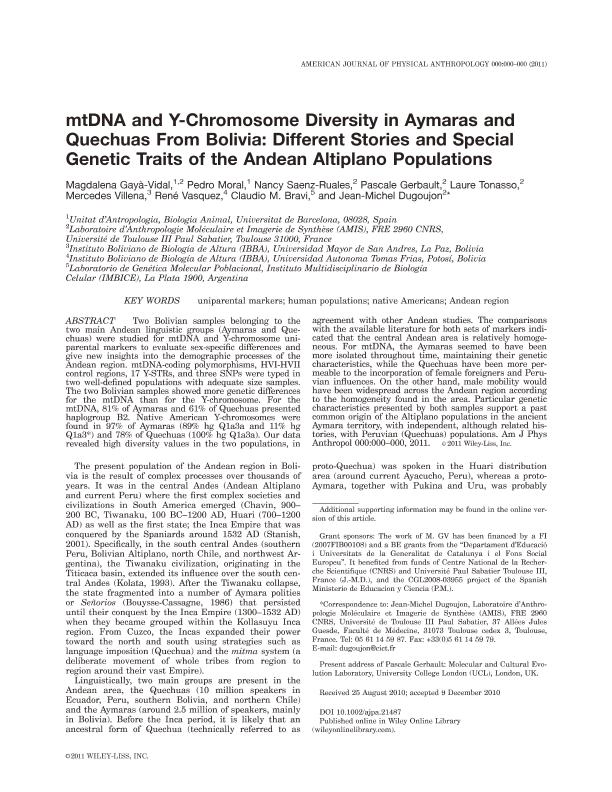Artículo
MtDNA and Y-chromosome diversity in Aymaras and Quechuas from Bolivia: Different stories and special genetic traits of the Andean Altiplano populations
Gayà Vidal, Magdalena; Moral, Pedro; Saenz Ruales, Nancy; Gerbault, Pascale; Tonasso, Laure; Villena, Mercedes; Vasquez, René; Bravi, Claudio Marcelo ; Dugoujon, Jean Michel
; Dugoujon, Jean Michel
 ; Dugoujon, Jean Michel
; Dugoujon, Jean Michel
Fecha de publicación:
06/2011
Editorial:
Wiley-liss, Div John Wiley & Sons Inc
Revista:
American Journal Of Physical Anthropology
ISSN:
0002-9483
Idioma:
Inglés
Tipo de recurso:
Artículo publicado
Clasificación temática:
Resumen
Two Bolivian samples belonging to the two main Andean linguistic groups (Aymaras and Quechuas) were studied for mtDNA and Y-chromosome uniparental markers to evaluate sex-specific differences and give new insights into the demographic processes of the Andean region. mtDNA-coding polymorphisms, HVI-HVII control regions, 17 Y-STRs, and three SNPs were typed in two well-defined populations with adequate size samples. The two Bolivian samples showed more genetic differences for the mtDNA than for the Y-chromosome. For the mtDNA, 81% of Aymaras and 61% of Quechuas presented haplogroup B2. Native American Y-chromosomes were found in 97% of Aymaras (89% hg Q1a3a and 11% hg Q1a3*) and 78% of Quechuas (100% hg Q1a3a). Our data revealed high diversity values in the two populations, in agreement with other Andean studies. The comparisons with the available literature for both sets of markers indicated that the central Andean area is relatively homogeneous. For mtDNA, the Aymaras seemed to have been more isolated throughout time, maintaining their genetic characteristics, while the Quechuas have been more permeable to the incorporation of female foreigners and Peruvian influences. On the other hand, male mobility would have been widespread across the Andean region according to the homogeneity found in the area. Particular genetic characteristics presented by both samples support a past common origin of the Altiplano populations in the ancient Aymara territory, with independent, although related histories, with Peruvian (Quechuas) populations.
Palabras clave:
ANDEAN REGION
,
HUMAN POPULATIONS
,
NATIVE AMERICANS
,
UNIPARENTAL MARKERS
Archivos asociados
Licencia
Identificadores
Colecciones
Articulos(IMBICE)
Articulos de INST.MULTIDISCIPL.DE BIOLOGIA CELULAR (I)
Articulos de INST.MULTIDISCIPL.DE BIOLOGIA CELULAR (I)
Citación
Gayà Vidal, Magdalena; Moral, Pedro; Saenz Ruales, Nancy; Gerbault, Pascale; Tonasso, Laure; et al.; MtDNA and Y-chromosome diversity in Aymaras and Quechuas from Bolivia: Different stories and special genetic traits of the Andean Altiplano populations; Wiley-liss, Div John Wiley & Sons Inc; American Journal Of Physical Anthropology; 145; 2; 6-2011; 215-230
Compartir
Altmétricas



